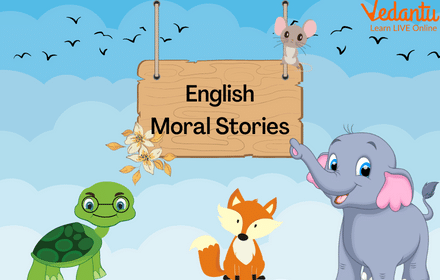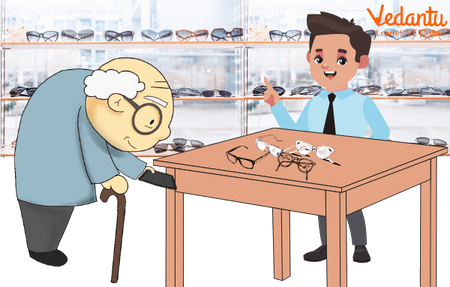Stories for 11-Year-Olds

Stories that Suitable for 11-Year-Olds
Stories create a deep impact on our lives. In this article, you will find fun and interactive stories which will make you laugh and learn at the same time. The story of the villager and the spectacles will teach you how ignorance of the core thing can take us on the wrong path and can make fun of ourselves.
Then the story As you Sow, So Shall you reap will show you how bad company can make one a bad person. Lastly, One of the most important lessons of life is “The importance of speaking truth”, in the story No one believes a liar. To know every detail, you must read these stories. These all stories are suitable for 11-year-old children as they have interesting characters with a lesson. So, let’s start reading!

Animals And Birds
The Villager And The Spectacles

The Villager And The Spectacles
There was a villager. He was uneducated. He didn't have any idea how to read and write. He frequently saw people wearing spectacles while reading books or papers. He started wondering 'If I also have spectacles, I can also read like these people. I should go to town and purchase a pair of spectacles for myself.”
So one day, he went to a town. He entered a spectacles shop and asked the shop owner for a pair of spectacles for reading. The shopkeeper gave him different pairs of spectacles and a book. The villager tried all the spectacles individually. But he was unable to read anything. He told the shop owner that all those spectacles were useless for him.
The shopkeeper looked at him suspiciously. Then he checked the book out. It was upside down! The shopkeeper said, "Maybe you don't know how to read.” The villager said, "No, I don't. I need to purchase spectacles so that I can read like others. But I cannot read with any of these spectacles." The shop owner controlled his laughter with great difficulty when he understood the genuine problem of his uneducated customer. The shopkeeper then said, "my dear friend, spectacles only correct your eye defect, not your reading and writing ability. To study first, you should learn how to read and write”.
The Moral of the Story
The moral of the Villager And The Spectacles is that ignorance is blindness.
As You Sow, So Shall You Reap

Three Thieves
One night, three thieves stole a lot of cash from a rich man's house. They put the money
in a bag and went to the forest. They felt extremely hungry. Thus, one of them went to a nearby town to purchase food. The other two stayed in the forest to deal with the bag of money. The thief that went for food had a malicious thought. He ate his food at a hotel. Then he bought food for his two mates in the forest. He mixed a strong poison with that food. He thought that those two would eat this contaminated food and die. Then, he will get all the money.
Meanwhile, the two wicked men in the forest chose to kill their mate in return. They thought that they would split the money among them. All three wicked men did their cruel plans. The thief who needed all the cash for himself came to the forest with the poisoned food. The two men in the forest hit him and beat him to death. Then they ate the poisoned food and died. Accordingly, these evil people met with an evil end.
The Moral of the Story
The moral of the story As You Sow, So Shall You Reap is that your actions determine what happens to you. If you do good with others, you will be rewarded with good things.
No One Believes A Liar

The Boy And Villager
Once upon a time a mischievous kid lived in a village that was at the feet of a hill. One day, he thought of having fun at the expense of his fellow villagers. After climbing on a high rock, he yelled as loud as possible, "Lion! Lion! Come, save me."
The villagers heard the yell and rushed to help him. But when they arrived there, they could see no lion and the kid was perfectly alright. The kid giggled at the fellow villagers saying, 'No Lion; I did it just for the sake of entertainment.' The villagers got highly irritated and returned with anger.
A few days after this incident, the kid repeated the entire act. Again the villagers went there for his rescue but were tricked once more. Now they decided not to be tricked by him any longer. Tragically, one day, the lion came there. Now the kid yelled, "Lion! Lion! as loud as he could". But no one came to help him that time. The lion attacked the kid. The kid battled hard to save himself, but the beast killed him within a few minutes.
The Moral of the Story
The moral of the story No One Believes A Liar is that liars are never rewarded and even if a liar speaks the truth, people will not believe them.
Summary
In this article, we have learned about three stories that surely made you laugh and teach you the importance of truth. In the first story, it was the negligence of the core thing and it teaches us that we should not ignore anything for a long time. In the second story, it was the person who lived with evil who became evil. So, we should always surround ourselves with good things, good people, and good vibes. The third story tells us that always speaking the truth should not be compromised with fun.


FAQs on Stories for 11-Year-Olds
1. How did the boy prank the villagers?
He used to scream that the lion was chasing him. “The lion is chasing me!” When the villagers heard the cry and the scream of a boy, they came running up the hill to drive the lion away.
2. Why did the villager want to buy spectacles?
The villager wanted to buy the spectacles because he thought that if he would buy the spectacles, then he would be able to read and write like other people. But, his wrong thinking led him to purchase a pair of spectacles with which he thought he could read and write but that’s not possible when he told the shopkeeper that he is still unable to read things. He was uneducated, that was the reason he was unable to read. We should not ignore the main reason behind the cause.
3. What is the meaning of the idiom “As you sow, so shall you reap”?
The idiom “As you sow, so shall you reap” means that the way a person behaves with others will determine how others will behave toward him. If a person has good thoughts about others, he will have everyone’s trust and if a person has negative thoughts about others, other people will never talk to him and he will be left alone.
In short, if you do good to others you will also be rewarded with good and if you are bad or unkind, you will get the same from others.




